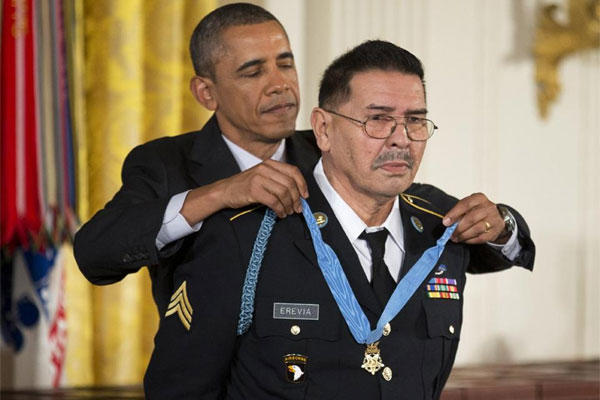Defense Secretary Chuck Hagel on Thursday ordered a review of all decorations and awards programs in a decision that was partly influenced by the review process that resulted in President Obama awarding 24 Medals of Honor to Army veterans earlier this week.
"I think it has," Pentagon Press Secretary Adm. John Kirby said when asked if Hagel's directive was influenced by the 12-year investigation that led to the upgrading of 24 Distinguished Service Crosses to the Medal of Honor.
The Army looked at 602 cases from World War II, Korea and Vietnam, but decided that only 24 could be verified for the Medal of Honor. The Air Force reviewed 186 cases, and the Navy reviewed the cases of a total of 89 sailors and Marines, but both services decided not to upgrade any awards to the Medal of Honor, Pentagon officials said.
"It's not a science," Kirby said of the methods for judging who should get the Medal of Honor. Hagel recognizes that it is a "subjective process," Kirby said.
In his directive, Hagel said he wanted "a comprehensive review of the department's military decorations and awards program to ensure it provides avenues to appropriately recognize the service, sacrifices and actions of our servicemembers."
"The Department of Defense has a solemn obligation to recognize and honor service members who distinguish themselves in combat," Hagel said. "After 13 years of war, we must use lessons learned in Iraq and Afghanistan to improve our awards program and ensure that our troops are being honored appropriately."
The review will focus on combat and valor awards but it will also re-examine the drone service medal that was repealed by Hagel last year.
"The review will determine how best to recognize service members who use remote technology to directly impact combat operations," Hagel said.
Last year, Hagel halted production of the controversial Distinguished Warfare Medal, which was to have recognized troops who have a remote impact on the battlefield through drone operations or cyberwarfare.
Veteran service organizations had lobbied against the DSW and its proposed placement in the order of precedence above the Bronze Star with combat ‘V' device. Hagel later said that he was considering replacing the DSW with a "distinguishing device" that would attach to an existing medal.
The medals review directive went to Gen. Martin Dempsey, chairman of the Joint Chiefs of Staff, the service secretaries and to the combatant commanders. The review will be conducted by Jessica Wright, acting Under Secretary for Personnel.
Pentagon officials said the review will also focus on "how to make the awards process more timely." Critics of the current system frequently note that high-level awards are often delayed until the recipient has left the service.
Another area of focus will be the standards used by each service for recommending awards and whether there are differences that need to be reconciled, Kirby said. Hagel wanted an answer to the question: "Are there seams between the services that can be closed or not?" Kirby said.
The ceremony at the White House on Tuesday was the largest group award of the Medal of Honor since World War II. Eight of the 24 recipients served in Vietnam, nine in Korea and seven in World War II.
The awards were the result of Congressional action in 2002 that directed the Pentagon to determine whether the recipients of high-level awards from World War II, Korea and Vietnam may have been denied the Medal of Honor because of discrimination against their Hispanic-American and Jewish-American heritage.
Pentagon officials described a difficult review process that involved searching for available records and then seeking to find and interview individuals who may have served with the potential recipient or witnessed combat action.
The review was complicated by the 1973 fire at a St. Louis records center that destroyed thousands of personnel files, the officials said. At the end of the process, the Defense Department determined that a total of 19 individuals had been denied the Medal of Honor because of discrimination.
In the course of the review, those involved in the process also came across the cases of another five individuals whose actions in combat were judged to be worthy of an upgrade to the Medal of Honor, the officials said.
At the emotional White House ceremony on Tuesday, President Obama said the award of the 24 Medals of Honor "reminds us of one of the enduring qualities that makes America great, that makes us exceptional."
Only three of the awards went to living recipients. All three were Vietnam veterans and their "above and beyond" acts of valor occurred in Vietnam.
"We're here to correct an injustice in history, to right 24 wrongs. Today, on the doorstep of our nation's capital, we honor 24 heroes. Their sacrifice shall never be in vain," Hagel said Wednesday inducting the 24 into the Pentagon's Hall of Heroes.
Kirby said that Hagel's order was influenced by his own service in Vietnam. Hagel, an Army infantry sergeant who was wounded twice, often saw "his own comrades doing incredibly brave things" for which they were not recognized," Kirby said.
The review directive followed frequent complaints from Congress on how the awards process works.
On Thursday, the 11th anniversary of the start of the Iraq war, Rep. Duncan Hunter, R-Calif., called for another effort by the the Defense Department to find a living recipient for the Medal of Honor from the Iraq war.
"The fact that there has yet to be a living Medal of Honor recipient from the war in Iraq should sound alarm bells," Hunter said in an opinion piece for the Defense One website.
"Call it a mystery, call it intentional," Hunter said. "Whatever the case, it is one failure that is still within the power of the Defense Department to fix."
-- Richard Sisk can be reached at richard.sisk@monster.com





























